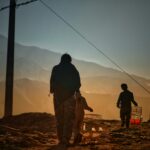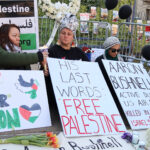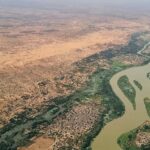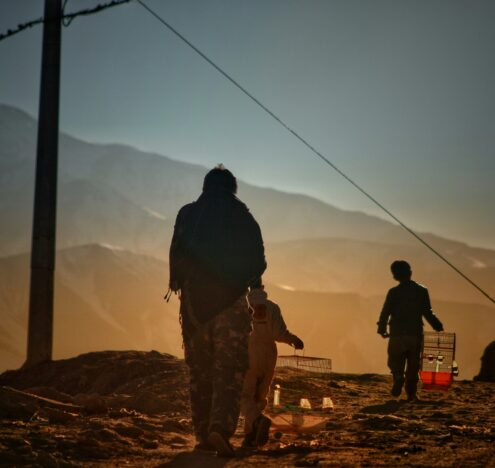Rather than maintaining antagonistic policies, the Biden administration should actively engage Pyongyang in order to induce the hermit kingdom to change from the inside. Washington’s relentless military pressure, economic sanctions, and forced infiltration of external information into North Korea could cause Pyongyang to further raise tensions on the Korean peninsula, resulting in more suffering inflicted on North Koreans.
A massive number of North Koreans have already long undergone extreme suffering. It began with economic hardships. The end of the Cold War devastated North Korea’s already inefficient communist economy due to the sudden loss of trade partners, such as the Soviet Union and East European communist nations. Frequent natural disasters like flooding and droughts further damaged the nation’s moribund economy. As a result, about one million people starved to death in the mid-1990s.
North Korea’s nuclear and missile development has also led to ineffective use of the nation’s limited resources while inviting a series of economic sanctions imposed by the UN and individual states, such as the United States and Japan. The post-2017 sanctions regime adopted after North Korea’s sixth nuclear test and long-range missile tests was particularly harsh, cutting off 90% of oil resources imported by North Korea. Hence, North Koreans have suffered from serious economic predicaments like malnutrition and the chronic lack of food.
THE PANDEMIC’S IMPACT ON NORTH KOREANS
North Koreans’ suffering has further deepened because of the COVID-19 pandemic. As the virus swept over China, Pyongyang swiftly decided to shut down its border in January 2020. This might have been an unavoidable decision for Pyongyang since the pandemic could significantly disrupt the stability of the North Korean regime, which has a poor public health care infrastructure. However, these border shutdowns must have been a fatal blow to North Koreans, many of whom depend on imported Chinese products. Before the pandemic, the international sanctions were detrimental to the North Korean economy, but Pyongyang was able to sustain mainly due to China’s tacit support. However, because of the voluntary shutdown caused by the pandemic, the prices of daily necessary goods in North Korean markets have sharply increased, and food crises have permeated North Korean society.
Washington’s relentless military pressure, economic sanctions, and forced infiltration of external information into North Korea could cause Pyongyang to further raise tensions on the Korean peninsula, resulting in more suffering inflicted on North Koreans.
In addition to these economic difficulties, many North Koreans have endured the absence of freedom and grim human rights violations, including torture, starvation rations, and forced labor imposed on prison camp detainees. These human rights violations might have worsened during the ongoing pandemic period. The need to prevent dissent by controlling society more tightly has been likely to intensify under the pandemic condition in which economic troubles deepen. For example, the number of prison camps inmates reportedly increased from about 209,000 in March 2020 to 232,400 in July 2021. During this period, tens of thousands of North Koreans were sent to prison camps because of violations of both COVID-19 quarantine regulations and the “anti-reactionary thought” law. Pyongyang enacted this law in December 2020, so “anyone in the country caught watching South Korean entertainment or copying the way South Koreans speak is subject to strict fines and prison sentences.” Another grim human rights violation is that the order allegedly commands North Korean “troops to shoot on sight any trespassers who cross its northern border in violation of the country’s pandemic closure.”
WHY INCESSANT PRESSURE DOESN’T WORK
Given these dreadful circumstances, what measures can the United States — which holds an important key to changing the situation — adopt to help relieve the pain of North Koreans living in inhumane conditions? A commonly cited approach is for the United States to make every effort to push the Kim Jong-un regime to the corner through military pressure, economic sanctions, and even information operations. The US Senate Foreign Relations Committee recently passed a bill titled the “Otto Warmbier Countering North Korean Censorship and Surveillance Act of 2021,” which aims at sending external information into North Korea more effectively.
At a glance, these measures seem to be effective and emotionally satisfactory in terms of punishing the repressive Kim dynasty. Moreover, it could be the best scenario for North Koreans if the Kim Jong-un regime succumbed to external pressure and changed its policy course in a cordial direction. Another positive scenario would be that such a hawkish approach leads to the smooth demise of the Kim regime, and then a more benevolent regime takes power or inter-Korean unification takes place in Seoul’s favor.
On the other hand, Washington’s relentless pressure on Pyongyang could worsen conditions for North Koreans. Above all, such antagonistic tactics could further instigate the Kim regime to heighten already high military tensions on the Korean peninsula, which is not helpful to mitigate the misery of North Koreans. If the heightened tension led to a military conflict on the Korean peninsula, the suffering of North Koreans would escalate dramatically, not to mention astronomical human and material costs inflicted on South Korea, Japan, and the United States.
Pyongyang will likely further exploit Washington’s hostile policy as an instrument for consolidating domestic unity. In this process, Pyongyang will perhaps use more brutal means to prevent dissent among North Koreans and further tighten its grip over them. Meanwhile, despite Washington’s hostile measures, it seems hard to expect the North Korean regime to change its behavior as long as China, which has aspired to avoid chaotic conditions stemming from regime collapse in the North, continues to support the maintenance of the Kim regime. There may be always a possibility of North Korea’s sudden regime collapse due primarily to its own problems, such as economic crises and power struggles among elites, so the United States and other stakeholders need to be ready to deal effectively with such contingencies. Nevertheless, exerting continual pressure should not be Washington’s primary policy toward Pyongyang, because it cannot change North Korea’s behavior in practical terms. US policy instead has inflicted more suffering on North Koreans.
MITIGATING SUFFERING THROUGH ACTIVE ENGAGEMENT
In this context, it is more effective for Washington to engage Pyongyang than to maintain antagonistic policies to help alleviate the tremendous hardships North Koreans endure. To this end, the US government should grapple with resolving the issue of North Korea’s nuclear weapons and missiles, which has persistently hindered the improvement of the relationship between Washington and Pyongyang.
Washington first needs to retreat from its intransigent stance on Pyongyang, dubbed “complete, verifiable, irreversible denuclearization” (CVID) or “final, fully verified denuclearization” (FFVD). Even though the United States and North Korea can reach another agreement in the future, these goals may not be plausible as long as North Korea remains a sovereign nation, not a defeated one. Pyongyang is not likely to fully allow external inspectors to verify the dismantlement of its nuclear materials, facilities, and weapons hidden in suspicious military bases or tunnels in mountainous terrains. Thus, with some flexibility, Washington should make a greater effort to resume nuclear and missile negotiations with Pyongyang through benevolent gestures like the provision of humanitarian aid, such as vaccines, medical supplies, and food items.
Even so, this engagement strategy is not to provide unilateral concessions without confirming North Korea’s denuclearization efforts. Rather, it is necessary for Washington to actively move toward positive directions in US–North Korea relations while striving to conclude and implement a reasonable nuclear deal based on the above-mentioned flexible stance. In this process, Washington and Pyongyang could work toward confidence-building, gradually heading for the possibility to make the end-of-war declaration, conclude the peace treaty, and normalize the US–North Korea diplomatic relationship.
It is painful to keep watching the three-generational autocratic regime continue to rule North Korean society and many North Koreans suffer from the absence of freedom, political suppression, and economic crisis. However, putting harsh pressure on North Korea continually could make the Kim regime more rigid and provocative, as witnessed in a recent series of its missile tests. That is, continual military pressure, economic sanctions, and forced infiltration of external information into North Korea could cause Pyongyang to further raise tensions on the Korean peninsula and the East Asian region. Therefore, Washington can try to induce Pyongyang to change from the inside by boldly improving US–North Korea relations. This approach can ultimately help mitigate North Koreans’ suffering while stabilizing East Asian regional security.
Yangmo Ku is Associate Professor of Political Science and Associate Director of the Peace and War Center at Norwich University. He coauthored a book titled “Politics in North and South Korea: Political Development, Economy, and Foreign Relations” (London: Routledge, 2018). He also serves as Editor of the Journal of Peace and War Studies.





















